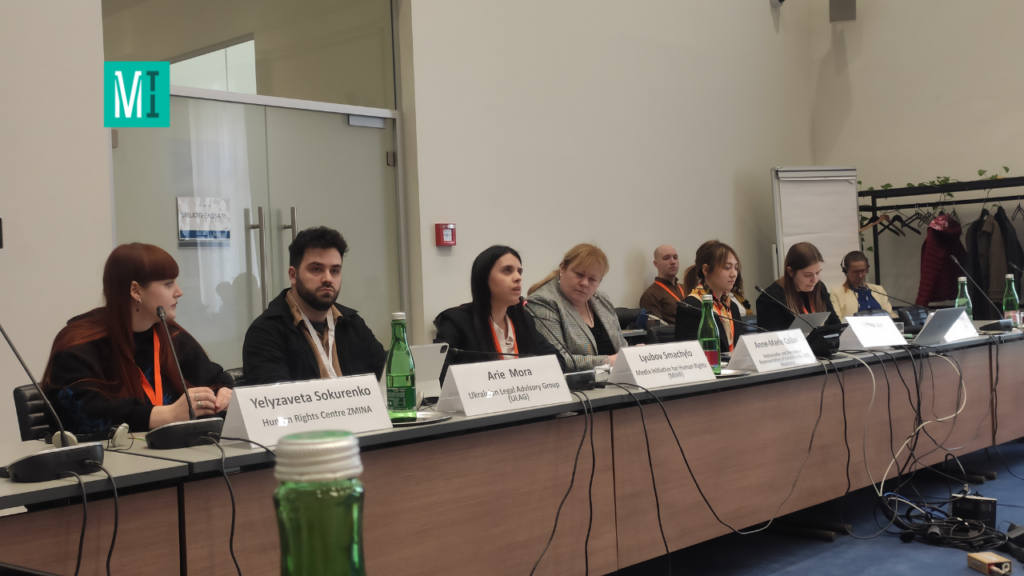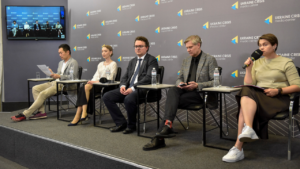“We are using all possible mechanisms and tools to show the scale of Russia’s crimes against Ukraine,” — Lyubov Smachylo

The Media Initiative for Human Rights has started an advocacy visit to the OSCE. Today, in Vienna, Lyubov Smachylo, MIHR’s analyst, participated in the event “Persecution of Ukrainian civilians in the occupied territories as a crime against humanity: efforts of Ukrainian civil society to restore justice.” It was organized by Ukrainian human rights activists of the Ukraine 5 AM Coalition: Media Initiative for Human Rights, Human Rights Center ZMINA, World Organisation Against Torture | OMCT, Crimea SOS, and the Ukrainian Legal Advisory Group. The event was supported by the Permanent Mission of Ireland to the OSCE, Human Rights House Foundation, and PHR.
Ambassador Anne-Marie Callan, Permanent Representative of Ireland to the OSCE, moderated the event. She noted that despite the high risks, Ukrainian human rights organizations, together with international partners, continue to document and investigate international crimes committed by representatives of the Russian Federation against the civilian population in the occupied territories of Ukraine.

Yelyzaveta Sokurenko, Head of War Crimes Documentation at ZMINA, spoke about documenting arbitrary detention, enforced disappearances, and torture. In particular, she focused on how ZMINA, together with the IHRC and OMCT, analyzes the testimonies received from victims and uses them to prove the crime against humanity committed by Russia. Sokurenko also emphasized the need to focus attention on the issue of Russia’s detention of Ukrainian civilians, including activists such as volunteers Iryna Horobtsova from Kherson and Margarita Kharenko from Melitopol.
At the same time, Liubov Smachylo, MIHR’s analyst, spoke not only about the process of documenting crimes but also about the tools used for this purpose:
— “We document Russia’s crimes against Ukraine, in particular, through in-depth interviews and surveys of released Ukrainian civilians and prisoners of war. They tell us about the conditions of detention in Russia, about torture. To document this more effectively, we use the I-DOC system. Working on this topic, the MIHR has created an online map of places of forced detention: 40 locations in the temporarily occupied territories and 56 in Russia.

According to the analyst, the MIHR team has so far identified 1,600 people held by Russia in detention centers. However, there is every reason to believe this number is much higher. In addition, the families waiting for the release of their loved ones are also victims of crimes which are so numerous that it is difficult to limit ourselves to one topic.
— “When you study the detention of civilian Ukrainians by Russia, you see many categories of people among them. One of them is medical personnel. So, together with our partners from PHR, we started researching Russia’s attacks on Ukraine’s healthcare system. In total, we have recorded 1400 attacks on medical infrastructure and its workers,” emphasized Smachylo.
She also noted that the MIHR seeks and uses all possible tools and mechanisms to achieve justice in the war of the Russian Federation against Ukraine. One of them was the OSCE Moscow Mechanism on the Prosecution of Ukrainian Civilians, the launch of which MIHR has been advocating for over a year and a half. As a result, the report of the independent commission should demonstrate the scale of Russia’s crimes against Ukraine.

Arie Mora from ULAG emphasized the importance of joint efforts to achieve justice, mainly to work with the national Ukrainian justice system and apply the universal jurisdiction mechanism. He added that when it comes to establishing a special tribunal, it should consider not only the crime of aggression but also other crimes, such as war crimes and crimes against humanity.
Speaking about Russia’s crimes against Ukraine, Sabina Ilyasova from Crimea SOS called for keeping in focus not only the crimes of the full-scale invasion but also those that have been going on since 2014, in particular in occupied Crimea, where local activist Reshat Ametov was killed.
Summarizing the facts and testimonies presented during the event, Yevhenia Andreyuk, a representative of the World Organisation Against Torture | OMCT, said that the persecution of civilians, detention, and torture is a systemic policy of Russia towards the occupied territories and civilians who disagree with the occupation. The top leadership of the Russian Federation is involved in creating and applying this policy. That is why, Andreyuk is convinced, it is vital to investigate all this not as individual episodes or war crimes but as a crime against humanity — a systematic and targeted persecution of civilians.






